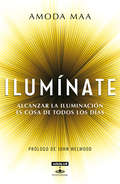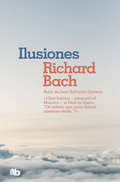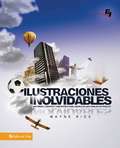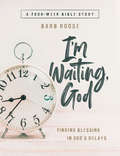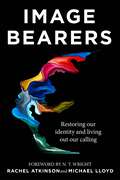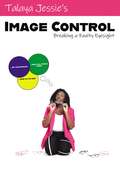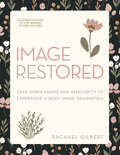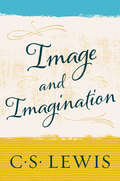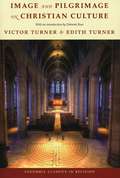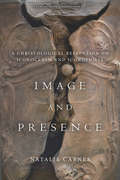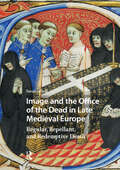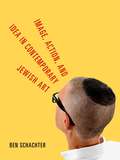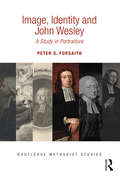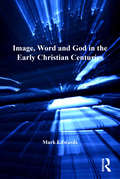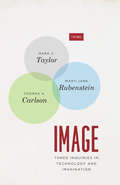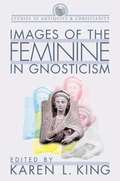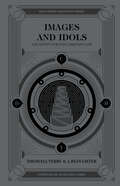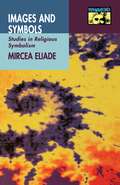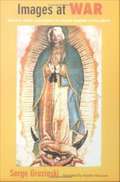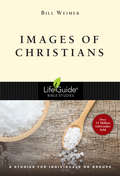- Table View
- List View
Ilumínate: Alcanzar la iluminación es cosa de todos los días
by Amoda MaaLa iluminación no es algo exclusivo de los sabios, los monjes o las personas que meditan. La iluminación se puede experimentar en la vida diaria y este libro te explica cómo. Amoda Maa elimina algunos de los mitos más comunes sobre la iluminación y ofrece una explicación accesible de los alcances de la conciencia despierta para cualquier persona que desee encontrar paz y plenitud en medio de este mundo caótico. Con claridad, pasión y gracia, Ilumínate ofrece orientación sobre cómo tu vida diaria puede llevarte al despertar y a la trascendencia. Este libro te ayudará a balancear la espiritualidad con temas recurrentes de la vida cotidiana como la abundancia, las relaciones personales, el bienestar físico, el trabajo, el dinero y la creatividad para alcanzar la felicidad y la plenitud en tu vida. Prólogo de John Welwood
Ilusiones (Centro Literario)
by Richard BachPor el autor de Juan Salvador Gaviota. Historia para descubrir lo más hondo de nosotros mismos. En el espacio aéreo sin nubes que se extiende entre los campos de maíz de Illinois y el azul infinito, un hombre deposita su fe en la hélice de su biplano. Para ese piloto, la fe es tan real como un depósito lleno de gasolina# hasta que se encuentra con Donal Shimoda, un antiguo mecánico que se define como un mesías y es capaz de lograr que las penas desaparezcan y que la imaginación remonte el vuelo. En Ilusiones descubrimos las verdades atemporales que dan alas a nuestras almas: que la gente no necesita máquinas voladoras para levantar el vuelo, que incluso las nubes más oscuras tienen un sentido cuando nos situamos por encima de ellas y que los mesías pueden encontrarse en lugares tan insospechados como un campo de heno, un pueblo perdido en medio de la llanura o, sobre todo, en lo más hondo de nosotros mismos.
Ilustraciones Inolvidables: Historias, cuentos y anécdotas para aquellos que hablan en público
by Wayne Rice¡QUE TUS CHARLAS CON LOS JÓVENES BRILLEN CON LAS ILUSTRACIONES INOLVIDABLES DE LOS MEJORES Y MÁS EXPERIMENTADOS ORADORES! Se acabó la búsqueda de ilustraciones animadas para energizar tus charlas con los jóvenes. ¡Llegó Ilustraciones Inolvidables! Wayne Rice, un experimentado pastor de jóvenes seleccionó y pulió cien de las mejores historias, parábolas y anécdotas disponibles en la actualidad. Todas las ilustraciones aparecen organizadas por categorías y te ayudarán a llevar tus predicaciones, pláticas, charlas o conferencias a un nuevo nivel. Este material te hará un mejor conferencista y te permitirá comunicar las enseñanzas eternas de la Palabra de Dios de una manera fresca y digna de recordar. ¡TUS JÓVENES TE AGRADECERÁN QUE USES ESTE LIBRO!
Im Waiting, God - Women's Bible Study Guide with Leader Helps: Finding Blessing in Gods Delays (I’m Waiting, God)
by Barb RooseFind help and hope for times when it's hard to wait on GodDo you ever feel like God is taking too long to answer your prayers? Have you ever taken matters into your own hands, only to discover that you’ve made the situation worse?Waiting on God challenges our faith when the bills are stacking up, our families are falling apart, or our dreams feel like they won't come true. We know that God hears our prayers, but it’s hard when the clock is ticking yet He hasn’t shown us the answer.In this four-week Bible study, Barb Roose invites us to explore the stories of women in the Bible who had to wait on God— women such as Hannah, Ruth, Tamar, and the unnamed woman who suffered for over a decade with a painful medical condition. If you’ve felt anxious, angry, discouraged or depressed because God isn’t giving you what you want, their stories will breathe fresh hope and practical next steps in your life. As a reforming control lover, Barb mixes in her personal stories of learning how to wait for God during long seasons of unanswered prayers, family difficulties, and challenging times in ministry. Together we will discover that there is goodness and blessing to be found in times of waiting, including a closer relationship with God than we’ve ever dared to dream.Other components for the Bible study, available separately, include a DVD."Barb Roose tackles the topic of patience in a way that really hit home for me personally. I have a lot of "why, how, and when" questions for God. Combining in-depth Scripture study with practical tools and personal stories, this study is one of the best I’ve ever read! —Melissa Spoelstra, Bible teacher, speaker, and author of Romans: Good News That Changes Everything and numerous other Bible studies and booksWhen waiting is hard and long, the last thing you need is someone disregarding your pain, with platitudes like "just push through." In I’m Waiting, God, Barb walks with us in our waiting. Warm, tender, and a help for moving forward, Barb’s study has left me stronger, knowing I can wait so His glory is seen. —Lynn Cowell, author of Make Your Move and member of the Proverbs 31 Ministries speaker and writer teamBarb Roose is a wonderful role model of walking out biblical truth while in life’s waiting room. This study is a must read for anyone wondering what to do while waiting and wanting to stay close to God in the meantime. —Pam Farrel, best-selling author of over forty books, including Discovering Hope in the Psalms: A Creative Bible Study Experience Bible Study Features: A shorter four-week study is ideal for in-between or busy times. Accessible and friendly format. Each week concludes with a devotional lesson featuring prayer journaling, helping women create "memorial stones" during a waiting season. DVD features dynamic, engaging teaching in four 20-minute segments. Participant Workbook includes group session guides, discussion questions, prayers, video viewer guides, and leader helps.
Image Bearers: Restoring our identity and living out our calling
by Michael Lloyd Rachel AtkinsonRestoration is one of the basic building-blocks to Christian growth: it affects the way we relate to God, to ourselves, and to others. When we allow God to restore us, shape us and refine us into the people we were made to be, we can enjoy His presence more fully, live more freely, and reflect His image more closely.Drawing on the work of a close friend and counsellor, Ruth Miller, who died in 2013, Image Bearers has been inspired by Ruth's significant ministry of individual counselling and pastoral healing. Beginning with a theological framework for restoration, each chapter builds on the brokenness we experience in life - our anxieties, fear and failures - and equips us with spiritual practices to improve our prayer, evangelism and pastoral care, giving us a greater vision for God's restoration in our own lives. Image Bearers is written for anyone wishing to grow into greater Christian maturity. In this joint venture, Rachel Atkinson and Michael Lloyd encourage us to live lives that are theologically grounded and practically applied; restoration cannot simply be taught but must be experienced, lived and modelled.
Image Control: Breaking a Faulty Eyesight
by Talaya JessieWhat do you do when wisdom is calling you by your name? What do you do when purpose is yearning to be fulfilled in your spirit? What do you do when your mind can no longer grasp the anonymity of your destiny? Image Control takes you on a journey of discovering your perception. It helps you realize the factors in shaping your identity. The generation I am apart of is filled with so many creatives, but it seems as if we are afraid to pull out our maximum potential by the roots. It is almost as if we are waiting for people to see our value and validate why and what we were put on this earth to do. In a world where who you are and what you do matters the most, it is so easy to get consumed with the opinions of others. What if life was not necessarily about the things you accomplish? What if it was about how you accomplished those things? Was it with integrity or did you have to sacrifice a piece of yourself to be accepted? When you push past the boundaries and extremities of understanding your perception, you will then realize what was blocking your true self. You will begin to understand the why behind your actions. You will begin to understand the why to specific things your heart may desire. We all have dreams, misfortunes and pain. But what if we took back our treasure from the hands of others and the pit of our shortcomings? Will there be a possibility to sharpen our God given tools and gain understanding toward the use of those tools? Who would we actually become in the process? Will we continue to walk in facades? What if everyone in the world did the work to look deep within their soul? Would there be substance or lack? What if we took the blinders off? Would we only see the things that hurt us in life or the entirety of every situation we have had to encounter? The process of breaking a faulty eyesight is no easy one, but it leads you to an atmosphere that can no longer be controlled outside of you. The definitive question is will you do the work and be okay with looking a little funny while doing it?
Image RESTored - Includes Six-Session Video Series: Tear Down Shame and Insecurity to Experience a Body Image Renovation
by Rachael GilbertThis whole-person, interactive approach to body image includes coloring sheets, journaling prompts, and therapist insights that ground you in God&’s love and build you up in truth. Are you tired of being at war with your body—and with your thoughts about your body? Rachael Gilbert struggled with shame when she didn&’t measure up to her dream body image. Then, as a fitness instructor and licensed counselor specializing in disordered eating, she realized how many of us bury the same painful insecurities. But keeping up appearances is exhausting. We need restoration from the inside out. In Image RESTored, Rachael offers professional guidance, coloring pages, Scripture, prayers, journaling prompts, and a link to online teaching videos to help you experience true freedom. See your whole self in a new way as you learn: A biblical perspective on eating, weight loss, fitness, and self-confidence rooted in God&’s love. Counselor-inspired strategies to help you appreciate how God made you. How to reframe stories that formed your attitude toward your body. Tools for overcoming comparison and trauma. Ways to use thoughts and feelings so they help you rather than sabotage you. Rich with spiritual and therapeutic insights, this Christian body image workbook calls you to experience healing and wellness that starts with knowing God&’s love for you—mind, soul, body, and spirit. Presented by Esther Press: Books for Courageous Women This interactive study guide includes a free QR code and URL to access all six videos, plus additional content for engaging study as a group or on your own. To aid you in your planning, following are the session titles and video run times: 1 Counselor's Cornerstone / Video Chat One 8:41 2 Counselor's Cornerstone / Video Chat Two 9:02 3 Counselor's Cornerstone / Video Chat Three 8:23 4 Counselor's Cornerstone / Video Chat Four 7:10 5 Counselor's Cornerstone / Video Chat Five 8:53 6 Counselor's Cornerstone / Video Chat Six 7:20
Image and Imagination
by C. S. LewisImage and Imagination presents some of C.S. Lewis's finest literary criticism and religious exposition. This selection gathers together forty book reviews--never before reprinted--as well as four major essays which have been unavailable for many decades, and a fifth essay, "Image and Imagination," published for the first time. The essays and reviews substantiate Lewis's reputation as an eloquent and authoritative critic across a wide range of literature, and as a keen judge of contemporary scholarship, while his reviews of The Hobbit and The Lord of the Rings will be of additional interest to scholars and students of fantasy.
Image and Imagination
by C. S. LewisImage and Imagination presents some of C.S. Lewis's finest literary criticism and religious exposition. This selection gathers together forty book reviews--never before reprinted--as well as four major essays which have been unavailable for many decades, and a fifth essay, "Image and Imagination," published for the first time. The essays and reviews substantiate Lewis's reputation as an eloquent and authoritative critic across a wide range of literature, and as a keen judge of contemporary scholarship, while his reviews of The Hobbit and The Lord of the Rings will be of additional interest to scholars and students of fantasy.
Image and Imagination
by C. S. LewisImage and Imagination presents some of C.S. Lewis's finest literary criticism and religious exposition. This selection gathers together forty book reviews--never before reprinted--as well as four major essays which have been unavailable for many decades, and a fifth essay, "Image and Imagination," published for the first time. The essays and reviews substantiate Lewis's reputation as an eloquent and authoritative critic across a wide range of literature, and as a keen judge of contemporary scholarship, while his reviews of The Hobbit and The Lord of the Rings will be of additional interest to scholars and students of fantasy.
Image and Pilgrimage in Christian Culture (Columbia Classics in Religion #Vol. 11)
by Victor Turner Edith TurnerFirst published in 1978, Image and Pilgrimage in Christian Culture is a classic work examining the theological doctrines, popular notions, and corresponding symbols and images promoting and sustaining Christian pilgrimage. The book examines two major aspects of pilgrimage practice: the significance of context, or the theological conditions giving rise to pilgrimage and the folk traditions enabling worshippers to absorb the meaning of the event; and the images and symbols embodying the experience of pilgrimage and transmitting its visions in varying ways. Retelling its own tales of "mere mortals" confronted by potent visions, such as the man Juan Diego who found redemption with the Lady of Guadalupe and the poor French shepherdess Bernadette whose encounter with the Lady at Lourdes inspired Christians across the globe, this text treats religious visions as both paradox and empowering phenomena, tying them explicitly to the times in which they occurred. Offering vivid vignettes of social history, it extends their importance beyond the realm of the religious to our own conceptions of reality.Extensively revised throughout, this edition includes a new introduction by the theologian Deborah Ross situating the book within the work of Victor and Edith Turner and among the movements of contemporary culture. She addresses the study's legacy within the discipline, especially its hermeneutical framework, which introduced a novel method of describing and interpreting pilgrimage. She also credits the Turners with cementing the link between mysticism, popular devotion, and Christian culture, as well as their recognition of the relationship between pilgrimage and the deep spiritual needs of human beings. She concludes with various critiques of the Turners' work and suggests future directions for research.
Image and Presence: A Christological Reflection on Iconoclasm and Iconophilia
by Natalie CarnesImages increasingly saturate our world, making present to us what is distant or obscure. Yet the power of images also arises from what they do not make present—from a type of absence they do not dispel. Joining a growing multidisciplinary conversation that rejects an understanding of images as lifeless objects, this book offers a theological meditation on the ways images convey presence into our world. Just as Christ negates himself in order to manifest the invisible God, images, Natalie Carnes contends, negate themselves to give more than they literally or materially are. Her Christological reflections bring iconoclasm and iconophilia into productive relation, suggesting that they need not oppose one another. Investigating such images as the biblical golden calf and paintings of the Virgin Mary, Carnes explores how to distinguish between iconoclasms that maintain fidelity to their theological intentions and those that lead to visual temptation. Offering ecumenical reflections on issues that have long divided Protestant, Catholic, and Orthodox traditions, Image and Presence provokes a fundamental reconsideration of images and of the global image crises of our time.
Image and the Office of the Dead in Late Medieval Europe: Regular, Repellant, and Redemptive Death (Visual and Material Culture, 1300-1700)
by Sarah SchellImage and the Office of the Dead in Late Medieval Europe explores the Office of the Dead as a site of interaction between text, image, and experience in the culture of commemoration that thrived in the fourteenth and fifteenth centuries. The Office of the Dead was a familiar liturgical ritual, and its perceived importance and utility are evident in its regular inclusion in devotional compilations, which crossed the boundaries between lay and religious readers. The Office was present in all medieval deaths: as a focus for private contemplation, a site of public performance, a reassuring ritual, and a voice for the bereaved. Examining the images at the Office of the Dead and related written, visual, and material evidence, this book explores the relationship of these images to the text in which they are embedded and to the broader experiences of and aspirations for death.
Image, Action, and Idea in Contemporary Jewish Art (Dimyonot: Jews and the Cultural Imagination #5)
by Ben SchachterContemporary Jewish art is a growing field that includes traditional as well as new creative practices, yet criticism of it is almost exclusively reliant on the Second Commandment’s prohibition of graven images. Arguing that this disregards the corpus of Jewish thought and a century of criticism and interpretation, Ben Schachter advocates instead a new approach focused on action and process.Departing from the traditional interpretation of the Second Commandment, Schachter addresses abstraction, conceptual art, performance art, and other styles that do not rely on imagery for meaning. He examines Jewish art through the concept of melachot—work-like “creative activities” as defined by the medieval Jewish philosopher Maimonides. Showing the similarity between art and melachot in the active processes of contemporary Jewish artists such as Ruth Weisberg, Allan Wexler, Archie Rand, and Nechama Golan, he explores the relationship between these artists’ methods and Judaism’s demanding attention to procedure.A compellingly written challenge to traditionalism, Image, Action, and Idea in Contemporary Jewish Art makes a well-argued case for artistic production, interpretation, and criticism that revels in the dual foundation of Judaism and art history.
Image, Identity and John Wesley: A Study in Portraiture (Routledge Methodist Studies Series)
by Peter S. ForsaithThe face of John Wesley (1703–91), the Methodist leader, became one of the most familiar images in the English-speaking and transatlantic worlds through the late eighteenth and nineteenth centuries. After the dozen or so painted portraits made during his lifetime came numbers of posthumous portraits and moralising ‘scene paintings’, and hundreds of variations of prints. It was calculated that six million copies were produced of one print alone – an 1827 portrait by John Jackson R.A. as frontispiece for a hymn book. Illustrated by nearly one hundred images, many in colour, with a comprehensive appendix listing known Wesley images, this book offers a much-needed comprehensive and critical survey of one of the most influential religious and public figures of eighteenth-century Britain. Besides chapters on portraits from the life and after, scene paintings and prints, it explores aspects of Wesley’s (and Methodism’s) attitudes to art, and the personality cult which gathered around Wesley as Methodism expanded globally. It will be of interest to art historians as a treatment of an individual sitter and subject, as well as to scholars engaged in Wesley and Methodist studies. It is also significant for the field of material studies, given the spread and use of the image, on artefacts as well as on paper.
Image, Word and God in the Early Christian Centuries (Studies in Philosophy and Theology in Late Antiquity)
by Mark EdwardsChristianity proclaims Christ and the incarnate word of God; the Bible is described as the Word of God in both Jewish and Christian tradition. Are these usages merely homonymous, or would the ancients have recognized a more intimate relation between the word incarnate and the word proclaimed? This book investigates the concept of logos in pagan, Jewish and Christian thought, with a view to elucidating the polyphonic functions which the word acquired when used in theological discourse. Edwards presents a survey of theological applications of the term Logos in Greek, Jewish and Christian thought from Plato to Augustine and Proclus. Special focus is placed on: the relation of words to images in representation of divine realm, the relation between the logos within (reason) and the logos without (speech) both in linguistics and in Christology, the relation between the incarnate Word and the written text, and the place of reason in the interpretation of revelation. Bringing together materials which are rarely synthesized in modern study, this book shows how Greek and biblical thought part company in their appraisal of the capacity of reason to grasp the nature of God, and how in consequence verbal revelation plays a more significant role in biblical teaching. Edwards shows how this entailed the rejection of images in Jewish and Christian thought, and how the manifestation in flesh of Christ as the living word of God compelled the church to reconsider both the relation of word to image and the interplay between the logos within and the written logos in the formulation of Christian doctrine.
Image: Three Inquiries in Technology and Imagination (TRIOS)
by Thomas A. Carlson Mark C. Taylor Mary-Jane RubensteinThe three essays in Image, written by leading philosophers of religion, explore the modern power of the visual at the intersection of the human and the technological. Modern life is steeped in images, image-making, and attempts to control the world through vision. Mastery of images has been advanced by technologies that expand and reshape vision and enable us to create, store, transmit, and display images. The three essays in Image, written by leading philosophers of religion Mark C. Taylor, Mary-Jane Rubenstein, and Thomas A. Carlson, explore the power of the visual at the intersection of the human and the technological. Building on Heidegger’s notion that modern humanity aims to master the world by picturing or representing the real, they investigate the contemporary culture of the image in its philosophical, religious, economic, political, imperial, and military dimensions, challenging the abstraction, anonymity, and dangerous disconnection of contemporary images. Taylor traces a history of capitalism, focusing on its lack of humility, particularly in the face of mortality, and he considers art as a possible way to reconnect us to the earth. Through a genealogy of iconic views from space, Rubenstein exposes the delusions of conquest associated with extraterrestrial travel. Starting with the pressing issues of surveillance capitalism and facial recognition technology, Carlson extends Heidegger’s analysis through a meditation on the telematic elimination of the individual brought about by totalizing technologies. Together, these essays call for a consideration of how we can act responsibly toward the past in a way that preserves the earth for future generations. Attending to the fragility of material things and to our own mortality, they propose new practices of imagination grounded in love and humility.
Images Of The Feminine In Gnosticism (Studies In Antiquity And Christianity)
by Karen L. KingIn this groundbreaking collection of essays, King and other contributors engage in a systematic study of issues of gender in Gnosticism. Using a variety of critical methods, the writers ask questions such as: What is the relationship of gendered images to the real lives of women and men? Did ascetic or libertine practices offer an attractive alternative to women in a patriarchal society? Are the images of strong, female goddesses, saviors, and heroines an indication Gnosticism would have been attractive to women? Is it plausible that women in some gnostic groups were authors, teachers, and leaders? Is it possible that some of the Gnostic texts we possess were written by women? What parts did women play in ritual? Did asceticism or libertinism have a different set of social functions for women than for men? These lucid essays offer significant insights into the cultural context and religious practices of Gnosticism.
Images and Idols: Creativity for the Christian Life
by Thomas J Terry J. Ryan ListerChristians ought to be leading the way in creativity, but we rarely do. God is the Creator of all things, and He created us in His image. Creativity is woven into the very fabric of our humanity. Therefore, Christians should value and champion creativity as a vital part of our image-bearing role. Instead Christians often don&’t know what to do with creatives and creatives don&’t know what to do with Christianity. On one side you have Christians who neglect or discount art, imagination, and beauty altogether. On the other, you have artists who make idols out of each of these good things. Ryan Lister, a theology professor, and Thomas Terry, a spoken word artist and founder of Humble Beast, team up to help restore the connection between creativity and theology. Images & Idols is a theological and artistic exploration of creativity in the Christian life. It will help creatives build a strong theological foundation for their art, while challenging the church to embrace a theology of beauty and creativity.
Images and Idols: Creativity for the Christian Life
by Thomas J Terry J. Ryan ListerChristians ought to be leading the way in creativity, but we rarely do. God is the Creator of all things, and He created us in His image. Creativity is woven into the very fabric of our humanity. Therefore, Christians should value and champion creativity as a vital part of our image-bearing role. Instead Christians often don&’t know what to do with creatives and creatives don&’t know what to do with Christianity. On one side you have Christians who neglect or discount art, imagination, and beauty altogether. On the other, you have artists who make idols out of each of these good things. Ryan Lister, a theology professor, and Thomas Terry, a spoken word artist and founder of Humble Beast, team up to help restore the connection between creativity and theology. Images & Idols is a theological and artistic exploration of creativity in the Christian life. It will help creatives build a strong theological foundation for their art, while challenging the church to embrace a theology of beauty and creativity.
Images and Symbols: Studies in Religious Symbolism
by Mircea EliadeMircea Eliade--one of the most renowned expositors of the psychology of religion, mythology, and magic--shows that myth and symbol constitute a mode of thought that not only came before that of discursive and logical reasoning, but is still an essential function of human consciousness. He describes and analyzes some of the most powerful and ubiquitous symbols that have ruled the mythological thinking of East and West in many times and at many levels of cultural development.
Images and Symbols: Studies in Religious Symbolism (Bollingen Series #684)
by Mircea EliadeMircea Eliade--one of the most renowned expositors of the psychology of religion, mythology, and magic--shows that myth and symbol constitute a mode of thought that not only came before that of discursive and logical reasoning, but is still an essential function of human consciousness. He describes and analyzes some of the most powerful and ubiquitous symbols that have ruled the mythological thinking of East and West in many times and at many levels of cultural development.
Images at War: Mexico from Columbus to Blade Runner (1492-2019)
by Serge Gruzinski"If colonial America was the melting pot of modernity, it was because it was also a fabulous laboratory of images. . . . Just as much as speech and writing, the image can be a vehicle for all sorts of power and resistance. " So writes Serge Gruzinski in the introduction to Images at War, his striking reinterpretation of the Spanish colonization of Mexico. Concentrating on the political meaning of the baroque image and its function within a multicultural society, Gruzinski compares its ubiquity in Mexico to our modern fascination with images and their meaning. Although the baroque image played a decisive role in many arenas, especially that of conquest and New World colonization, its powerful resonance in the sphere of religion is a focal point of Gruzinski's study. In his analysis of how images conveyed meaning across linguistic barriers, he uncovers recurring themes of false images, less-than-perfect replicas, the uprooting of peoples and cultural memories, and the violence of iconoclastic destruction. He shows how various ethnic groups--Indians, blacks, Europeans--left their distinct marks on images of colonialism and religion, coopting them into expressions of identity or instruments of rebellion. As Gruzinski's story unfolds, he tells of Aztec idols, the cult of the Virgin of Guadalupe, conquistadors, Franciscans, and neoclassical attempts to repress the baroque. In the final chapter he discusses the political and religious implications of contemporary imagery--such as that in Mexican soap operas--and speculates about the future of images in Latin America. Originally written in French, this work makes available to an English audience a seminal study of Mexico and the role of the image in the New World.
Images of Anarchy
by Ioannis D. EvrigenisHobbes's concept of the natural condition of mankind became an inescapable point of reference for subsequent political thought, shaping the theories of emulators and critics alike, and has had a profound impact on our understanding of human nature, anarchy, and international relations. Yet, despite Hobbes's insistence on precision, the state of nature is an elusive concept. Has it ever existed and, if so, for whom? Hobbes offered several answers to these questions, which taken together reveal a consistent strategy aimed at providing his readers with a possible, probable, and memorable account of the consequences of disobedience. This book examines the development of this powerful image throughout Hobbes's works, and traces its origins in his sources of inspiration. The resulting trajectory of the state of nature illuminates the ways in which Hobbes employed a rhetoric of science and a science of rhetoric in his relentless pursuit of peace.
Images of Christians: 8 Studies for Individuals or Groups (LifeGuide Bible Studies)
by Bill WeimerScripture offers various metaphors and motifs for God's people: sheep, salt and light, branches, clay jars, friends, disciples, and more.®
